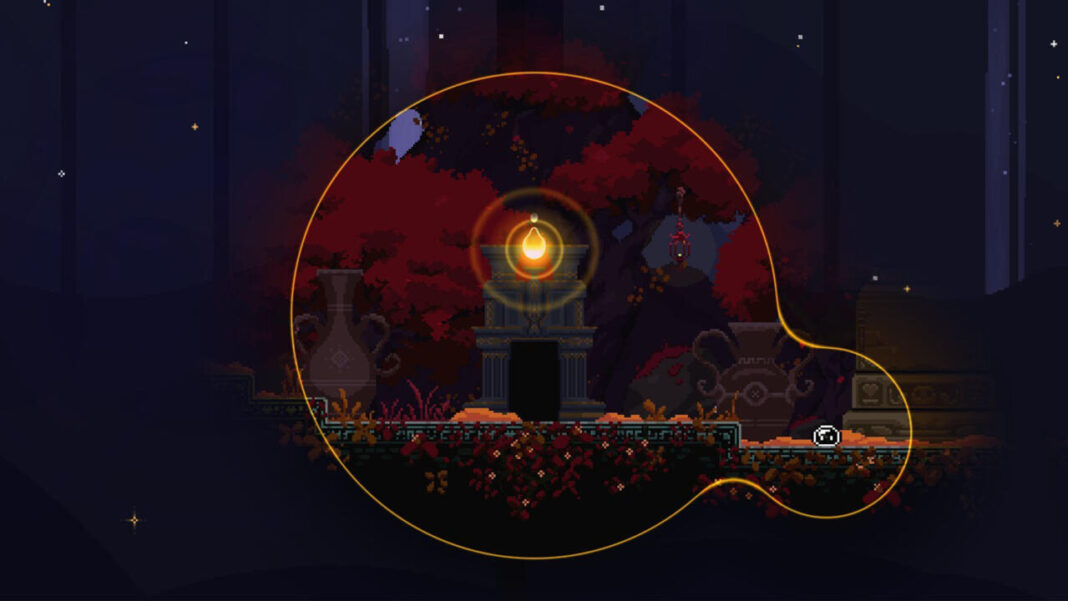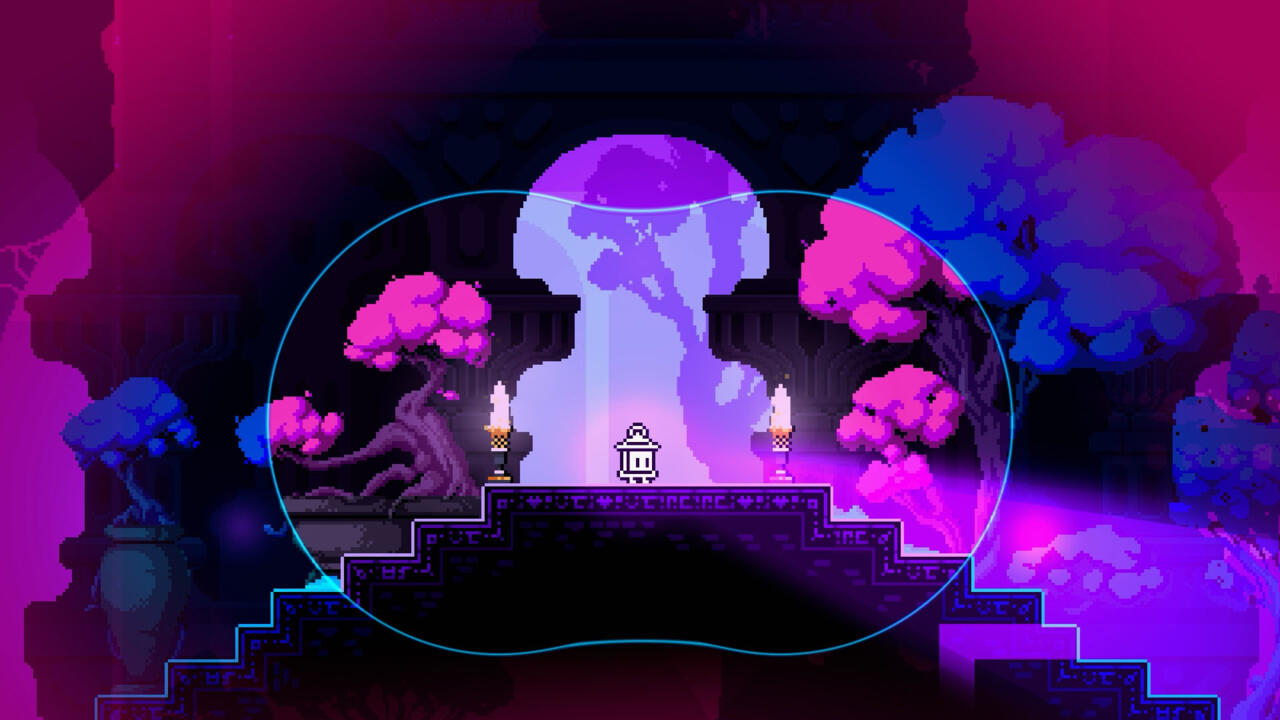If there’s one thing that developer Pastagames would like to make abundantly clear, it’s that it’s making a game about kindness. KarmaZoo is a 2D co-operative platformer for two to 10 players and the result of seven years of development conceived as a counterpoint to the majority of other platformers.
In the world of KarmaZoo, players are rewarded for working together and sacrificing themselves for others, rather than for individual skill or precision. Players take the form of a blob-like soul that is able to inhabit a variety of avatars drawn from the animal kingdom and beyond. As well as a double jump, each avatar has their own special skill: Hedgehogs hunker down to line nearby walls with climbable spikes, Whales produce a water spout that acts as a platform, and Lanterns light up dark areas for other players.
Friendly cooperation with your fellow players is key to success: “The whole game was born in the Métro in Paris,” game designer Nadim Haddad told me. “In the Métro we have these very heavy doors and when people open them they look behind them–this is the only place in Paris where people are naturally kind, because you’re not going to let that door shut on someone. The context of the place creates kindness and gratitude, and so we decided to make a game in which the context of the game creates gratitude and kindness too.”
In the game’s Loop mode, the player selects an avatar and joins a party of other players, who attempt to navigate to the end of a series of 2D levels filled with teamwork-centric puzzles to solve. Also present is Totem mode–a party game-style collection of various competitive multiplayer modes for up to eight players that seems tailor-made for local play.
Though the pixel-art style might recall the likes of Mattmakesgames’ Celeste and Towerfall, playing the game reminded me much more of fellow Devolver Digital title Heave Ho, another game in which careful collaboration is more important to success than twitchy, pixel-perfect platforming skill. Every puzzle from the co-op game canon is present and correct–expect locked doors with pressure switches, moving platforms, and areas that are inaccessible without a handy boost from your teammates.
Sticking with your team is vital–every player has a ring, or ‘halo,’ around their avatar, and as long as this intersects with another player’s halo, both can respawn indefinitely. If a player attempts to forge a path alone, their halo gradually shrinks. If it shrinks completely, or if the player dies while they’re alone, they cannot respawn until other players reach the portal to the next level.
The ability to respawn within the team’s halo is actually a key component to traversing some levels. When an avatar dies, they leave behind a tombstone that can act as a platform for their teammates, enabling them to reach the other side of a spiked pit or protect them from acid dripping from the ceiling. Dying, particularly as self-sacrifice for others, is encouraged. In fact, it’s a core game mechanic, taught in the game’s tutorial and factored into KarmaZoo’s light-touch lore. “It’s a cycle of life and death, it’s reincarnation. We don’t go all the way with it, it’s not the message of the game, but it’s in the lore. Dying in this game is positive,” said Haddad.
Each act of kindness is rewarded with Karma, a currency that can be spent to unlock more avatars in the Sanctuary, a surreal, temple-like space filled with statues of the games’ playable flora and fauna. Even within the hour or so I played, there was significant joy to be had in seeing the ways in which each and every avatar has been lovingly brought to life–who wouldn’t be charmed by seeing an anthropomorphised pear use its leafy stalk to hover, helicopter style? And that’s without even mentioning the singing. Blimey, the singing. Every avatar can sing at the press of a button (though some avatars seriously stretch the definition of singing), and many puzzles can be solved with a coordinated cacophony from your team. Watching 10 umbrellas screeching in unison to open a door is quite the experience.
Pastagames has factored in mechanics that help encourage collaboration … [the developer] hopes they have made a game that is immune to trolling
Seeing these unlikely teams of elephants, llamas, teapots, and cacti try to bulldoze their way around the fairly traditional platforming levels goes a long way to giving KarmaZoo a unique sense of anarchic charm. Levels are selected automatically from hundreds of possibilities, can be modified by perks chosen at the start of each round, and adapt not only to the experience of the players but to the abilities of your team’s avatars, too, meaning you won’t find yourself stuck behind a glass wall without a creature designed to break it.
On the other hand, there is plenty of potential for experienced players to form game-breaking combinations of avatars that will steamroll any level, inspired by lucky runs in roguelikes: “I love this feeling that sometimes you’ll just destroy the game, and other times you’ll wonder if it is even possible. This range is what we’re going for. Every time you play it will be different, because we see it as an evergreen game,” explained Haddad.
With upwards of 50 avatars to collect, progression comes in the form of purchasing them, but also in enabling clearer communication with your teammates through unlockable dances and emotes. However, Pastagames hopes players will form their own language long before unlocking these abilities, communicating with each other through demonstration, positioning and, of course, liberal use of their avatar’s chaotic singing.
There is the sense that, if a community springs up around the game, an in-game language will quickly form around it, too. This could be crucial as the game features no voice chat at all, even within private lobbies–a decision borne not only from a safeguarding concern given the game’s potential appeal to children, but also from Pastagames’ desire to foster communication and collaboration uninhibited by language and culture: “The golden path for the player is for them to be able to show things to others without telling them directly.”
If that sounds like a recipe for frustration, then you might be right. The game is considerably easier, and, damningly, perhaps more fun when played side-by-side, couch-co-op style, where easy verbal communication makes the puzzles a breeze. In fact, it’s hard to escape the feeling that however noble the intentions behind this game, its success will largely be determined by what happens when it comes into contact with the internet, a place hardly known for clear communication, collaboration, or kindness.
To its credit, Pastagames has factored in mechanics that help encourage collaboration, such as the aforementioned halo system, and the fact that helping new players grants more Karma than helping experienced ones. Haddad hopes they have made a game that is immune to trolling: “We’ve made this game because we were tired of gatekeeping in MMORPGs. We are not very skillful players anymore. We grew older and we want to keep playing with people, so we really made [the Loop mode] troll-free from day one. It’s in the DNA of the game.”
Nevertheless, it feels like there is an uncomfortable level of friction between their desire to create a welcoming, collaborative sandbox for players of any age, and KarmaZoo’s occasional adherence to the more traditional mechanics of 2D platformers and progression-based multiplayer games. I was left scratching my head at the fact that each level features a Super Mario Bros.-style timer that ticks down to a game over–why?! This felt like an obstacle to exactly the kind of patient collaboration Pastagames hopes to encourage and could limit the chance for organic understanding to develop between strangers in-game. In its current state, mechanics like this muddle Pastagames’ stated aim, punishing new players and old players alike.
From my time playing KarmaZoo, it’s clear there are the bones of a fun, engaging, charming game here. It’s always a pleasure to see a developer not only try something different, but attempt to make a game with an intention to, in some small way, make the world a better place. Pastagames clearly has high hopes for the online community spirit the game might engender; it remains to be seen whether KarmaZoo’s players will repay them in kind.
KarmaZoo is expected to launch for Xbox Series X|S, PS5, Nintendo Switch and PC in Summer 2023.



























